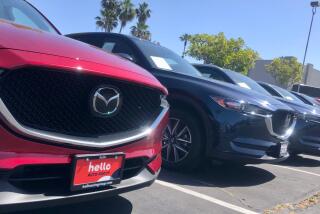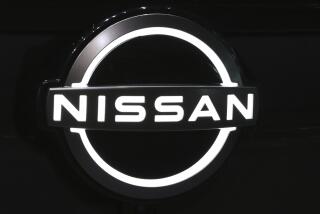A hidden threat to drivers
- Share via
In 2008, the National Highway Traffic Safety Administration released a study examining fatal accidents in which a car’s air bag should have deployed but didn’t. The most common reason wasn’t poor manufacturing by automakers. It was that the air bag was simply missing, never replaced after a previous crash.
The numbers weren’t large, averaging 51 accidents a year nationwide over the five years studied. But that doesn’t mean there’s no cause for concern. Who knows how many more cars are on the road without air bags? Presumably a whole lot more than the 51 that happen to get into accidents each year. Many used cars being offered for sale have been in accidents, then salvaged and resold, possibly without air bags. And the buyers may never know.
Air bags cost $1,000 to $3,000, expensive enough — and difficult enough to check on — that some auto repair shops charge for replacing them but don’t do the work. In 2009, a jury awarded $15 million to a couple whose son was killed in a truck whose air bags they paid to have replaced after they bought it as a salvage vehicle. The steering column had instead been stuffed with paper. A 2008 investigation by National Public Radio uncovered other cases in which repair shops had stuffed paper or other materials into the air bag compartment, or simply left it empty.
Most consumers aren’t aware that when they buy a used car, they should have a trustworthy, independent mechanic check the air bags. And because the NHTSA never looked further into the issue of all those missing air bags, there are no estimates of how many drivers are unknowingly driving without this protection.
A bill introduced this year by state Sen. Leland Yee (D-San Francisco) would make air bag repair fraud a crime punishable by a $5,000 fine, up to a year in prison, or both. It’s a good start. Dishonest repair shops would face charges whether or not there had been an accident. According to the nonprofit Center for Auto Safety, tougher penalties have been effective deterrents to other types of car repair fraud.
But the unknowns here demand a bigger and more comprehensive response. The numbers in the NHTSA study should have set off alarms and prompted a federal investigation into how commonly this fraud occurs. The agency should inspect a sampling of cars sold as used, especially salvage vehicles that were in previous serious accidents. Meanwhile, used-car buyers should be cautioned that kicking the tires doesn’t go nearly far enough.
More to Read
A cure for the common opinion
Get thought-provoking perspectives with our weekly newsletter.
You may occasionally receive promotional content from the Los Angeles Times.






